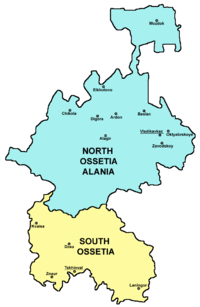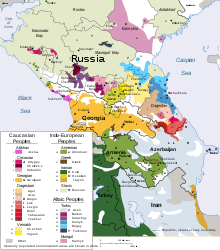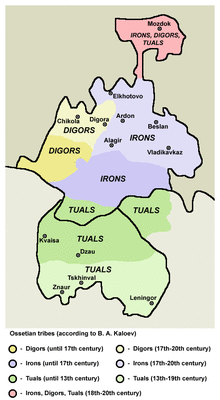
Ossetia (/ɒˈsɛtjə, ɒˈsiːʃə/;[1] Ossetian: Ир, Ирыстон, romanized: Ir, Iryston; Russian: Осетия, romanized: Osetiya; Georgian: ოსეთი, translit. Oseti) is an ethnolinguistic region located on both sides of the Greater Caucasus Mountains, largely inhabited by the Ossetians. The Ossetian language is part of the Eastern Iranian branch of the Indo-European languages family. The Ossetian-speaking area south of the main Caucasus ridge is recognized by most countries as within the borders of Georgia, but under the control of the de facto government of the Russian-backed Republic of South Ossetia. The northern portion of the region consists of the republic of North Ossetia–Alania within the Russian Federation.
Recent history

- For earlier history, see Alans, Sarmatians
- 1774 — North Ossetia becomes part of the Russian Empire[4]
- 1922 — Creation of the South Ossetian autonomous oblast.[5] North Ossetia remains a part of Russian SFSR, South Ossetia remains a part of Georgian SSR.
- 20 September 1990 — South Ossetia declares independence. The republic remained unrecognized, yet it detached itself from Georgia de facto. In the last years of the Soviet Union, ethnic tensions between Ossetians and Georgians in Georgia's former Autonomous Oblast of South Ossetia (abolished in 1990) and between Ossetians and the Ingush in North Ossetia evolved into violent clashes that left several hundred dead and wounded and created a large tide of refugees on both sides.[6][7]
Although a Russian-mediated and Organization for Security and Co-operation in Europe-monitored ceasefire was implemented in South Ossetia in 1992, the Georgian-Ossetian conflict still remains unresolved even though a recent peace plan proposed by the government of Georgia promised the South Ossetians larger autonomy and pledged expanded international involvement in the political settlement of the conflict. Meanwhile, the South Ossetian secessionist authorities demand independence or unification with North Ossetia under the Russian Federation while the international community refuses to recognize South Ossetia as an independent country and considers it part of Georgia.
On Sunday 12 November 2006, South Ossetians (mostly ethnic Ossetians) went to the polls to vote in a referendum regarding the region's independence from Georgia. The result was a "yes" to independence, with a turnout above 95% from those among the territory's 70,000 people who were eligible to vote at that time.[8] There was also a vote in favour of a new term for South Ossetia's president, Eduard Kokoity.
See also
- History of North Ossetia–Alania
- Alania
- Vladimir Gagloyev
- Jászság
- Alexander Kubalov
- Samachablo
References
- ^ "Ossetia". Collins English Dictionary.
- ^ "Archived copy". Archived from the original on 2017-02-05. Retrieved 2017-02-04.
- ^ http://s50.radikal.ru/i129/1003/22/2fec9d793e3d.jpg
- ^ Sokirianskaia (PDF), HU: CEU.
- ^ "South Ossetia profile". BBC News. 2016-04-21. Retrieved 2020-09-25.
- ^ Ghebali (2003), Helsinki (PDF), 4, CH.
- ^ Avrasya (2005), Ehatipoglu (PDF), TR: Obiv.
- ^ "South Ossetia: Russian, Georgian... independent?". OpenDemocracy. Retrieved 2008-08-10.
External links
- Ossetian Dance (YouTube), Rustavi Dance Company, 2008 (6 min 19 sec).
- Ossetian Dance (YouTube), 2008 (6 min 50 sec).
- Ossetian Folk Dance (YouTube), 2007 (3 min).
- Osetiya [Ossetia] (in Russian), SKFO Russia, archived from the original on 2011-07-09, retrieved 2011-01-17. Ossetian Republic News Portal.
